Nakayama is in between Narita And Haneda International Airport
<クッキーについての同意並び欧州居住者向けプライバシーポリシー>
中山・下総・散歩道
'Nogiku no Haka' and the Battles of Konodai
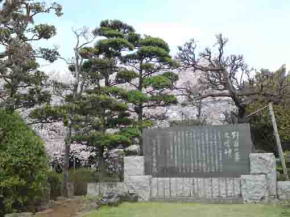
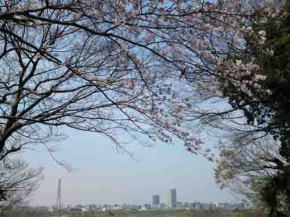
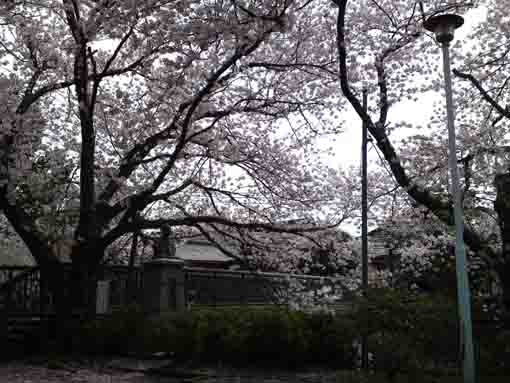
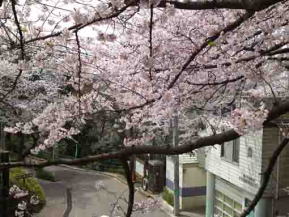
Walking through footpaths between rice fields on the east bank of Edogawa river, there is a small park Nogikuen Park on a cliff. It was named after the Platonic romance between Tamiko and Masao 'Nogiku no Haka' written by Sachio Ito since it sets in this area. Opposite of Nogikuen, the Literature Monument of Nogiku no Haka stands in Sairenji Temple. A gingko tree under where Masao waits for Tamiko was beside the entrance of the temple, so the sky seen at the park could be the same as Masao and Tamiko seeing.
The slope in front of Nogikuen was the old battlefield where Hojo Clan in Odawara and Satomi Clan in Awa had fought at. It is called the Second Battle of Konodai in Sengoku Period. The letters on the wooden pole beside the stone steps to Sairenji Temple tell 'the historical remains of the Battle of Konodai.
And in Nogikuen, there is the stone statue of Kinzo Shibuya who worked hard to develop Yagiri district in Matsudo city.
Nogikuen and Sairenji Temple covered with full blooming cherry blossoms in spring is an exciting course to enjoy history and Japanese literature.
Why don't you visit Nogikuen and Sairenji Temple?
The Literature Monument of 'Nogiku no Haka'
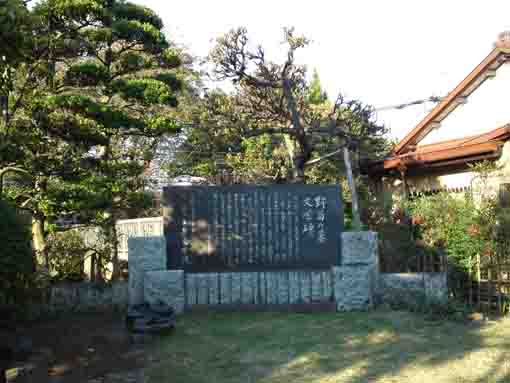
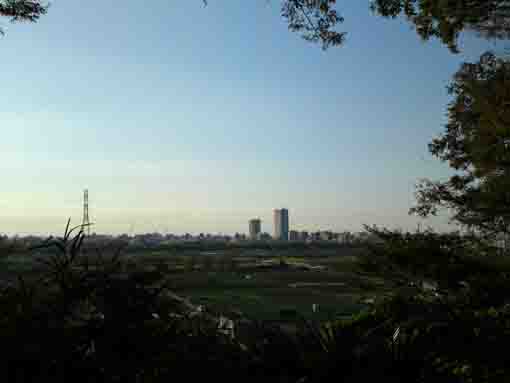
The Literature Monunmet of 'Nogiku no Haka (the grave of Nogiku)' is a big stone monument standing in Sairenji Temple in Shimo Yagiri, Matsudo city. On this monunent, a few paragraphs in the opening part of the love story about a young couple Tamiko and Masao 'Nogiku no Haka' written by Sachio Ito was scribed, the letters scribed on are by his disciple Fumiaki Tsuchiya's. A large gingko tree under where Masao waits for Tamiko stood beside the entrance of Sainrenji Temple.
The Literature Monument of 'Nogiku no Haka'
僕の家といふのは、矢切の渡しを東へ渡り、小高い岡の上でやはり矢切村と云っている所。崖の上になっているので、利根川は勿論中川までもかすかに見え、武蔵一ゑんが見渡される。秩父から足柄箱根の山々、富士の高嶺も見える。東京の上野の森だと云ふのもそれらしく見える。村はずれの坂の降口の大きな銀杏の樹の根で民子の来るのを待った。こゝから見下ろすと少しの田圃がある。色よく黄ばんだ晩稲に露をおんでシットリと打伏した光景は、気のせゐか殊に清々しく、駒のすくような眺めである。
伊藤佐千夫著 野菊の墓より
昭和39年10月
門人 土屋文明織
(Crossing Tonegawa River to east by a ferry called Yagiri no Watashi, my house is on a small hill called Yagiri Village. It is on a cliff, so we can see Tonegawa river and of course Nakagawa river, and also I can observe the landscapes all around in Musashi province. I can see the mountains in Chichibu, Mt. Ashigara, Mt. Hakone and Mt. Fuji. I see a forest that might be in Ueno from my house.
A large gingko tree stands on the upper part of a slope on the outskirt of the village, and I wait for Tamiko under the gingko tree. I can see a small rice field from here. It must be a wonderfully refreshing view that well yellow moisten mature rice plants are lying on the field.
From the book 'Nogiku no Haka' written by Sachio Ito
October 1964
By Fumiaki Tsuchiya a disciple of Sachio Ito)
野菊の墓文学碑より
Sachio Ito (1864 - 1913)
Sachio Ito was a poet in Meiji Era born in a farm in Sanmu-shi, Chiba-ken. His real name was Kojiro Ito. He entered Meiji University, but he dropped out because of the eye disease. Later he went to Tokyo again, he worked at a dairy farm, then he became a milk dealer at Honjo Tokyo.Sachio was greatly influenced by the book '歌よみに与ふる書 (Utayomi ni atauru sho 'the letters given to a poet') written by Shiki Masaoka, and he studied tanka poems at Shiki. He created tanka poems that sounds like poems in Myriad Leaves. He insisted that the life of tanka poems are cry. After Shiki had passed, he succeeded Tanka Poet Group in Negishi and he led the group, he published magazines named 'Ashibi (Andromeda)' and 'Araragi (Yew)'. It is said that Sachio completed the radical development on tanka poems started by Shiki Masaoka.
Akahiko Shimaki, Mokichi Saito and Fumiaki Tsuchiya were his disciples.
'Tanka Poems by Sachio' is his masterpiece. The novel 'Nogiku no Haka' is famous.
出典・抜粋・引用および参考
野菊の墓文学碑
山武市公式ホームページ
松戸市ホームページ
江戸川ライン歴史散歩 崙書房
大辞林
新制版 日本史辞典
日本世界 人名辞典
日本大百科全書(ニッポニカ)
ウィッキペディア
Cherry Blossoms around the Monument of 'Nogiku no Haka'

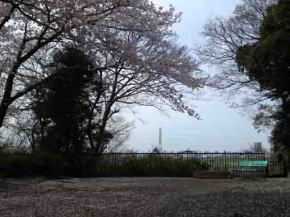
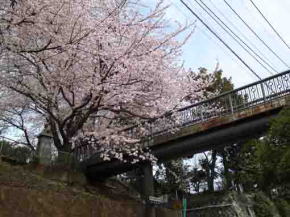
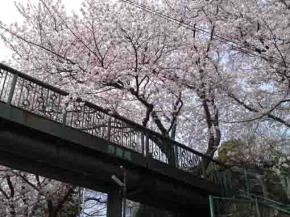
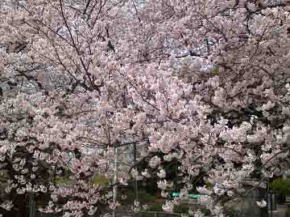
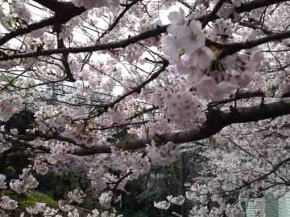
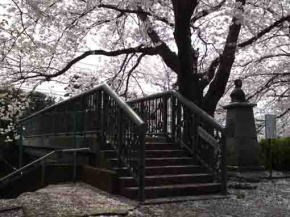

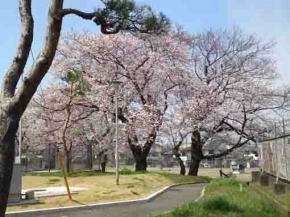
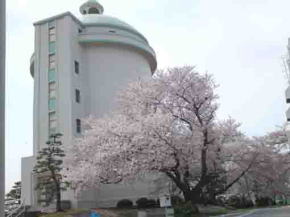
There are many cherry trees planted in Nogikuen Park and Sairenji Temple where the Literature Monument of 'Nogiku no Haka' was built in, and many thousands of cherry blossoms fully blooming in spring is extremely beautiful, especially the views from in the lower part of slope in front of them are amazingly wonderful.
Moreover, Kuriyama Water Purification Plant supplying water to people in Ichikawa and Matsudo city standing near the park has many cherry trees and they are very beautiful. Although nobody could not enter the plant without any permissions, you could enjoy seeing the cherry blossoms from out of its fences while you are walking to the bus stop.
The Old Battlefield of Konodai
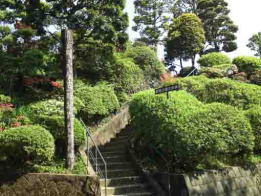
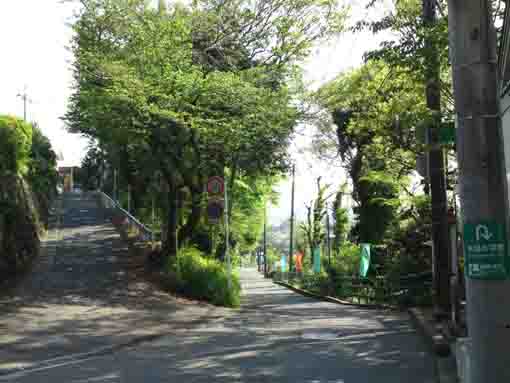
The Old Battlefield of the Second Battle of Konodai
There had been twice large battles broken out at Konodai on the southern tip of Shimousa Plateau and on the east side of Edogawa river, so they are called Konodai no Kassen (the battles of Konodai). There are several words scribed on the wooden pole standing beside the stone steps of Sairenji Temple, and they tell that 史跡永禄古戦場址永禄7年正月7日打死1千人 (the old battlefield of the battle happened in January 7th in 1564 and about one thousands of samurais died at the battle). This was one of battles between Hojo Clan in Odawara and Satomi Clan in Awa province in 1564, and the first struggle of the Second Battle of Konodai was happened at this slope in front of Sairenji Temple. There is a signboard that introduces specifically about the battles in it.The Second Battle of Konodai started in this area was that the retainers of the Hojo, Toyama and Tominaga at first attacked to the Satomi camped at Konodaijo Castle in January 7th, 1564 and they lost their lives at the battle. Next morning, the Hojo made a surprised attack to the Satomi, finally the Hojo won the battle and they defeated completely the Satomi since they had been off their guards because of their victory of the day before.
Under the cliff, the shore of Edogawa river widely opens, and the samurais might see Edojo Castle far behind the river. The pole tells that the great battle hanging on the supremacy of the southern Kanto region happened at this steep slope.
出典・抜粋・引用および参考
西蓮寺境内案内板
松戸市ホームページ
市川市ホームページ
里見公園内案内板
江戸川区ホームページ
江戸名所図会6 ちくま学芸文庫
戦略戦術兵器辞典 学研
クロニック戦国全史 講談社
江戸川ライン歴史散歩 崙書房
新編 市川歴史探訪 崙書房
ウィッキペディア
The Bronze of Kinzo Shibuya
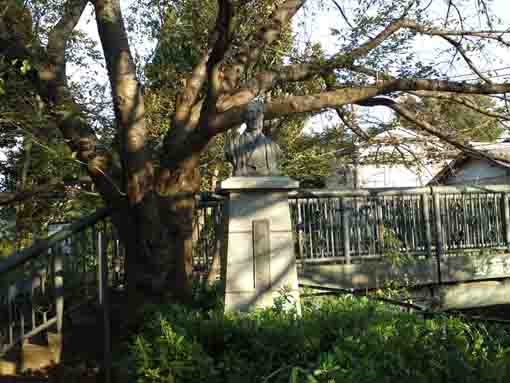
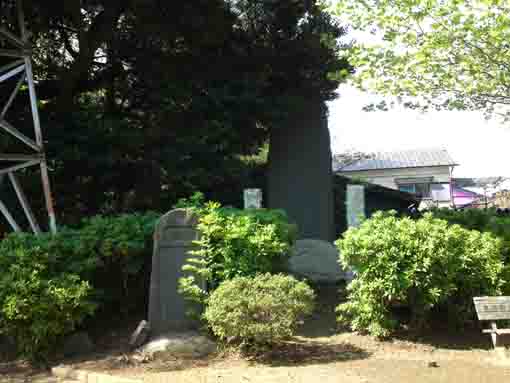
The Bronze Statue of Kinzo Shibuya who worked hard to develop Yagiri area stands in Nogikuen Park. And also the monument of cerebrating the completion of Water Works in the area stands in it. Moreover, Kuriyama Water Purification Plant is near the park. It is supposed that it might have any relations that they are in the small area. In addition, it is mysterious that Kinzo Shibuya and Sachio Ito was born in the same year of 1864.
Kinzo Shibuya
Kinzo Shibuya was a good-natured person born in Shimo Yagiri in 1864, he loved his home town and he put a drainage machine with volunteers in his town to avoid floods frequently had occurred since Yagiri was developed. He had worked hard on land improvement for about 30 years. He was officially commended by Chiba Arable Land Association (now Midori Net Chiba) in 1932 and by Imperial Arable Land Association (now National Federation of Land Improvement Associations) in 1938. In 1925, the bronze statue of Kinzo Shibuya was once built in, but it was taken by the government during WWII because of lack of resources. The Bronze Statue of Kinzo Shibuya was rebuilt to praise his achievement forever.June 1954
Written by Kisaji Saito, The Chairman of Yagiri Land Improvement
渋谷金蔵翁銅像記裏案内版より
出典・抜粋・引用および参考
渋谷金蔵翁銅像記裏案内版
The Access To The Monument of The Book 'Nogiku no Haka'
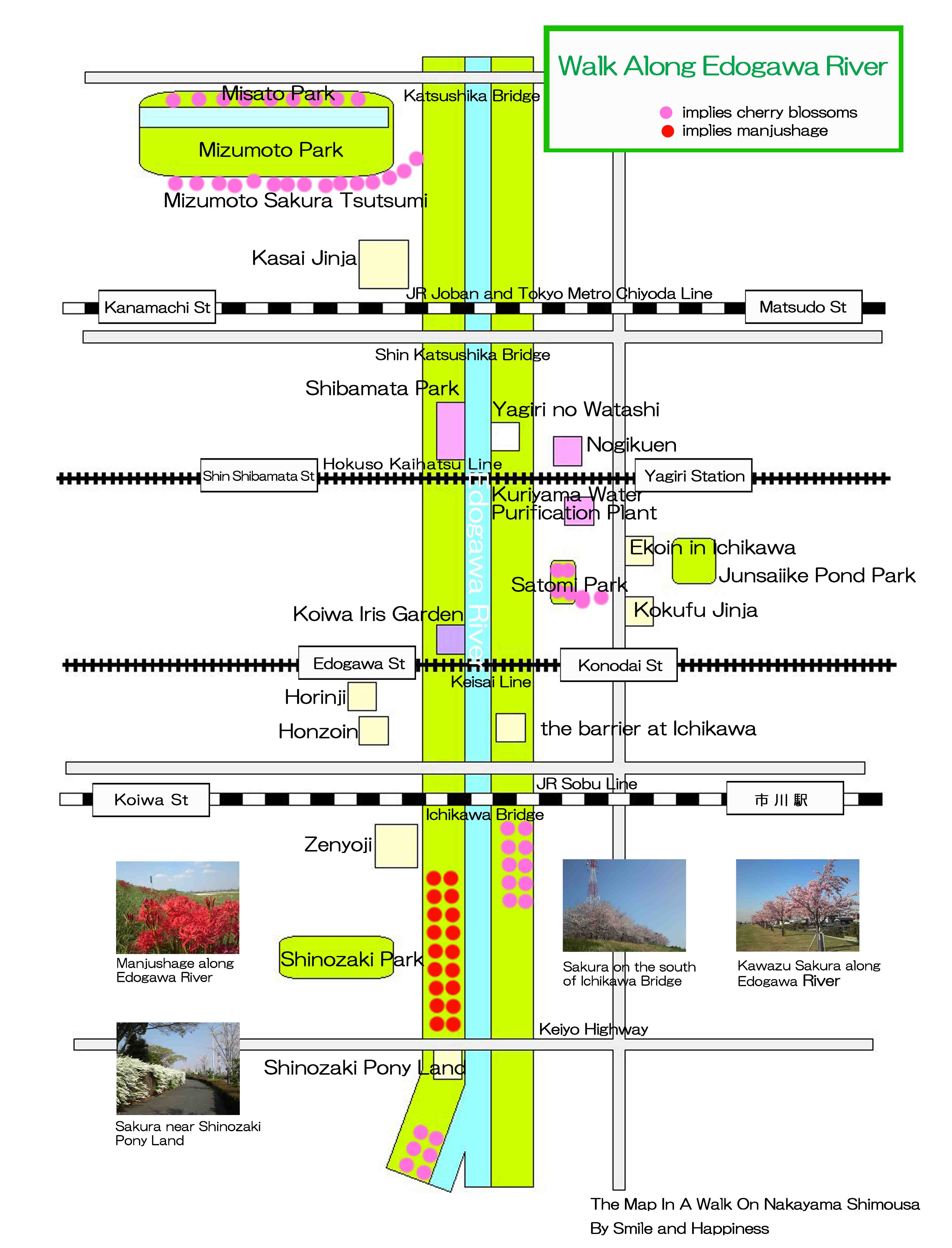
The map of the noted spots along Edo River
PDF of the map of the noted spots along Edo RiverThe Literature Monument of The Book 'Nogiku no Haka'in Seirenji Temple and Nogikuen Park
- 261 Shimo Yagiri, Matsudo-shi, Chiba-ken
- The Literature Monument of The Book 'Nogiku no Haka' in Seirenji Temple and Nogikuen Park has great accessibilities from both Narita and Haneda International Airport.
- From Narita International Airport, take Keisei Narita Sky Access line bound to Nippori Sta or Haneda International Airport and get off Shin Kamagaya Sta, transfer the line to Hokuso line bound to Nishi Magome or Haneda International Airport and get off Yakiri Sta.
- From Haneda International Airport, take Keikyu-line bound to Inba Nihon Daigaku (Nihon University) and get off Yakiri Sta.
- Take 8 minute walk from Yakiri Sta.
Noted Scenic Spots near Nogikuen and Nogiku no Haka
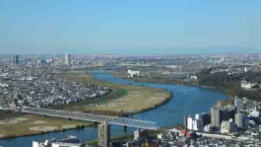
A Walk Along Edogawa River
The areas along the river have many noted spots that people could enjoy history and culture.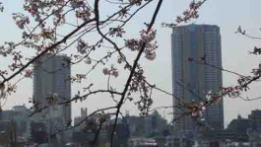
The Observatory on I-link Town Ichikawa
It commands a panoramic view of Mt.Fuji behind Tokyo.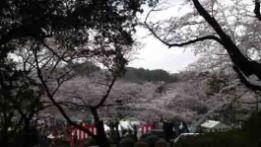
A Walk Around Satomi Park
The park is the noted scenic spot to see cherry blossoms, roses and colored leaves with many historical heritages.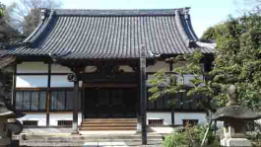
Ankokusan Soneiji Temple
It was treated as a high ranked temple as same as Upper Class Daimyos by Tokugawa Bakufu in Edo period.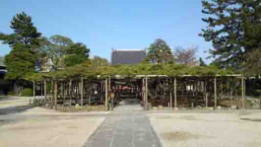
Zenyoji Temple
This temple is famous for Yoko no Matsu, the National Natural Property.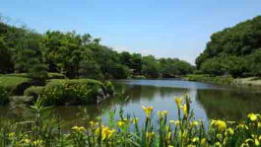
Junsaiike Pond Park
It has beautiful nature in every season and legends related to the Battles of Konodai.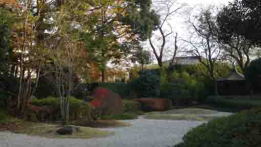
Ekoin Branch Temple in Ichikawa
Genkoji Temple, a branch temple of Ryogoku Ekoin has a beautiful garden and a mordern main hall with CafeTerrace Ekoin.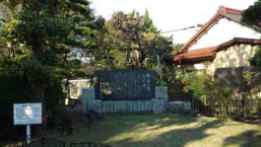
The Literature Monument of The Book 'Nogiku no Haka' and the Old Battlefield of Konodai
They are in Nogikuen Park and Sairenji Temple in Yagiri.- 広告 Advertisement -
